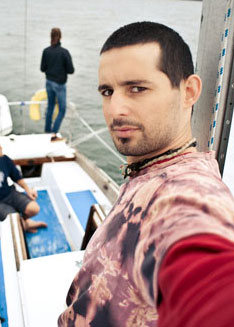Meet A. Murat Eren (Meren) Postdoctoral Researcher, Bay Paul Center


A. Murat Eren has always had a strong curiosity about the world around him. Life’s path has certainly taken him a long way from the small mountain village in Turkey where he spent summers shepherding cows. “That life was amazing, and memories of those days still force me once in a while to question what makes me do what I am doing today, instead of what I was doing back then,” says Murat (who goes by Meren), now a microbial ecology researcher working with Mitch Sogin in the Bay Paul Center.
Meren concentrated in computer science as an undergraduate in Turkey. In 2007, after working as a part of a team developing a computer operating system for the Turkish government, Meren came to the U.S. to pursue a Ph.D. in computer science at the University of New Orleans. But after three years, he rather suddenly changed the focus of his research to microbial ecology.
“Even though I spent most of my life in front of them, actually I really don't like computers,” says Meren. “But I am a curious person by nature, and computers are very good at answering questions when they are asked correctly. As I was pursuing my Ph.D., I realized that what I was doing in computer science was not the best way to utilize my abilities to satisfy my curiosity.”
While studying in New Orleans, Meren met Michael Ferris, a microbiology professor at Louisiana State University. “I immediately switched to Michael’s lab when I realized the questions he was interested in answering were actually very interesting,” says Meren. “Still I am trying to combine my experience in computer science to formulate and answer some of the most interesting questions I happened to stumble upon in life.”
In 2011 Meren was hired by Mitch Sogin to assist with the Bay Paul Center’s work on human microbiome project, an NIH initiative to identify and characterize microorganisms found in association with both healthy and diseased humans.
At the MBL, Meren develops algorithms to make sense of high-throughput sequencing data and better explain the diversity of bacteria in nature. “The human body is an assemblage of very interesting and diverse habitats to study many aspects of the microbial world,” explains Meren. “Thanks to the egocentricity of our species, we happen to know a lot about the human body, but I find any environment that is habitable by microbes interesting. Because essentially microbes are very interesting.”
In addition to his scientific work, Meren is a talented and passionate photographer whose images chronicle everything from the beauty of his homeland to the Occupy Wall Street movement. “I would have put becoming a photojournalist very high in the list if I had well-defined goals in life,” says Meren. “I think expression in any form is one of the most interesting human experiences. The amount of stories that can fit in a still image inspires me a lot.”